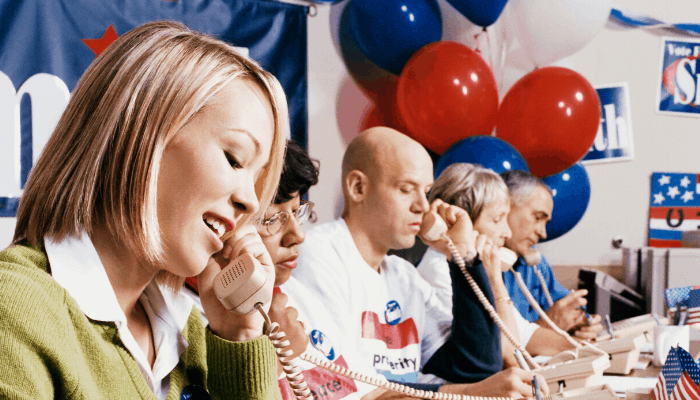
Every election season there are those among us who have the desire to get involved with a political campaign, but never quite figure out how to participate. That’s a shame because it’s very simple!
To volunteer for a political campaign follow these steps:
- Research the candidates running for the office you are interested in (e.g. president, representative, etc.);
- Choose a candidate to support;
- Find your candidate’s campaign website or contact the campaign to register as a volunteer;
- Once contacted, agree on a schedule and responsibilities;
- Carry out volunteer activities as agreed!
Signing up to volunteer for politics is easy. Volunteering can be a little more work though.
Below are some key things to know as you get started including how to choose the right campaign, what volunteers do, how students can get involved, and an important WARNING for volunteers.
Volunteering for the Right Campaign
Perspective volunteers are often most excited about volunteering for a presidential candidate, which is great!
But, don’t overlook campaigns for local or state offices, your representation in congress, or other lower-profile elected positions. Local elections have huge impacts, and you’re much more likely to increase your impact as a volunteer by working locally even if the campaign is national (see below for more). After all, “all politics are local.”
Whichever office you choose to focus your volunteer efforts on, it’s important to do a bit of research before you sign up – even if you already know the campaign you’d like to help.
If you do your research properly, you’ll be a much more successful volunteer and will likely have a better experience than if you volunteer only knowing that you support a candidate generally.
Two important things to research are 1) the candidates and their positions, and 2) the campaigns themselves.
Frist, researching all the candidates (yes, even in opposition parties) can help you identify the issues that are most at stake for the election and your position on these issues.
You’ll also build a basic understanding of how all the various candidates are talking about the issues and how your candidate talks about their platform.
This is important information for volunteers who may speak with many people about the candidate and their stance on key issues.
Knowing how the candidates are speaking about these issues will help make volunteers more persuasive; it will also give you a better experience and more stamina in your volunteer role.
Secondly, researching the campaigns themselves is also an important piece of background for future volunteers.
Doing some basic googling on your candidate’s campaign, campaign strategy, and campaign manager may give you a good look at what you’re getting into before diving in headfirst.
Some campaigns are known for certain environments – both good and bad.
For example, some campaigns may be known for employing cutting edge strategies, while others may be known for being chaotic environments with high turnover.
Either way, knowing how the campaign is performing can help you determine if its the best use of your time to support that candidate.
Doing those two bits of basic research – 1) all major candidates and their platforms, and 2) the campaigns themselves – will help magnify your impact and improve your experience by giving you the basic knowledge to be a thoughtful, effective volunteer.
What Volunteers Do for Political Campaigns
Volunteers can perform a range of tasks for political campaigns often linked to fundraising and outreach. Common tasks include assembling and distributing promotional materials, canvassing, event preparation and support, placing promotional phone calls, general office assistance, and other duties.
If you are working with a good campaign, they will be happy to have you on board and should work with you to find a task that’s right for you.
For example, the extroverts among us may jump at the chance to engage in one-on-one discussions with people by canvassing door-to-door or in public spaces.
Introverts, on the other hand, will be relieved to know that assembling campaign mailers and helping event staff behind the scenes are usually just as welcome contributions.
It’s good to be upfront with your volunteer coordinator about what role you’d like to play,
BUT sometimes volunteers are needed for things you may be reluctant to get involved in. So, it’s important to go into your role with an open mindset. Be ready to challenge yourself.
Political Volunteer Opportunities for College Students

Beyond volunteering for a campaign, college students can also get involved with existing political student groups or start their own. College Republicans and College Democrats can be found on most campuses nationwide. Students could also seek a part-time position or internship with campaigns or government offices.
If you’re over 18, you will be eligible for most volunteer opportunities and can follow the same process above for volunteering with a campaign.
If you’re under 18, you may still be eligible to volunteer for political campaigns; it’s best to reach out to the campaign you’re interested in for more information.
However, as a student, you will likely have other, unique opportunities to get involved.
Getting involved in student groups is undoubtedly one of the best ways college students can be politically active. While campaigns come and go, student groups can exist for a student’s whole time at school.
Even if you don’t want to get involved directly with a student group, attending a meeting of the College Democrats or College Republicans is a good way to engage with political campaigns
The ongoing nature of student groups means members stay engaged, build critical skills, and get to know the issues.
This process not only allows students to grow but also amplifies their impact over time as they build leadership and communication skills.
Political Volunteer Opportunities for High School Students
Beyond volunteering for a campaign, high school students can also get involved with existing political student groups or start their own. Students could also consider activities like the debate team and school newspaper or seek out a part-time job or internship with a local government office.
As stated in the previous section – If you’re over 18, you will be eligible for most volunteer opportunities and can follow the same process above to volunteer for a political campaign.
If you’re under 18, you may still be eligible to volunteer for political campaigns; it’s best to reach out to the campaign you’re interested in for more information.
Getting involved in student groups is undoubtedly one of the best ways high school students can be politically active. While campaigns come and go, student groups can exist for a student’s whole time at school.
The ongoing nature of student groups means members stay engaged, build critical skills, and get to know the issues. This process not only allows students to grow but also amplifies their impact as they improve their communication skills.
Getting involved in politics in high school is admirable. Beginning to get involved at a young age will sharpen social and communication skills which has found to be a determining factor in professional success.
In other words, if you’re a high school student who gets involved now you are setting yourself up for success later in life – no matter what your career ends being.
How to Volunteer for a Political Party (Not a Specific Campaign)

Some people may be wondering if it’s possible to volunteer with a party instead of a specific campaign during elections. The answer is yes! Here’s how…
To volunteer for a political party follow these steps:
- Find your party’s volunteer website (links below);
- Register as a volunteer or contact your local coordinator as directed by the website;
- Once in contact with a coordinator, agree on a schedule and responsibilities;
- Carry out volunteer activities as agreed.
Volunteer Sites for the Five Largest Political Parties:
- Constitution Party Volunteers
- Democrat Party Volunteers
- Green Party Volunteers
- Libertarian Party Volunteers
- Republican Party Volunteers
As a party volunteer, you will likely have fairly similar responsibilities to a campaign volunteer. Volunteering for a party can be a good way for supporters to get involved without having to pick a primary candidate to back early in a race. Instead, party volunteers help push their party’s overall platform rather than a specific candidate’s agenda.
WARNING!!!! YOU COULD HAVE A NEGATIVE IMPACT ON YOUR CAMPAIGN!!!
Before you sign up to save the world, you should be aware of what type of impact your participation could have on the political process.
While volunteers have been shown to make a difference in voter turnout, the impact of volunteers depends on who they are canvassing and how.
Because this is such an important topic, it required its own full-length post. Read more here: The Impact of Political Volunteers (How to Have a Positive Impact)
